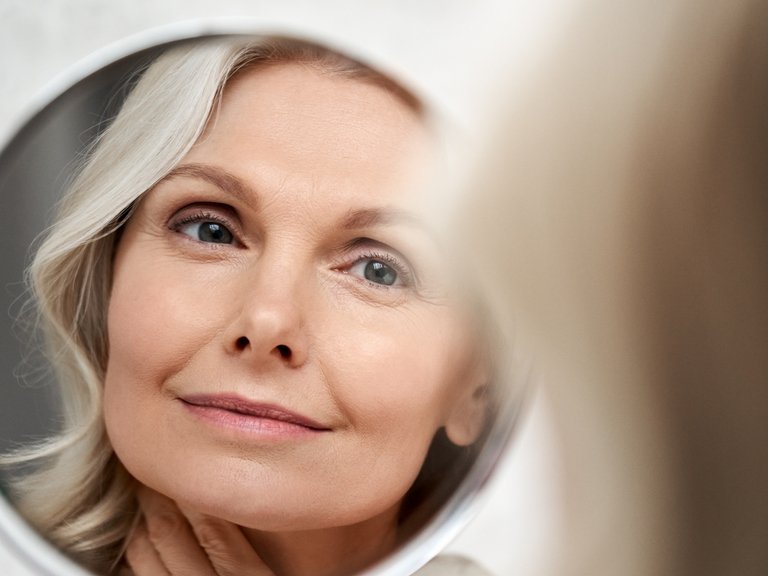All of us are concerned about our body image, independent of our gender, age or health condition. Why? Because a positive body-image makes us more confident in ourselves, feel more attractive and makes us feel better overall.
Self-image and body-image

Throughout life, the human body undergoes a continuous transformation. Most of the changes are natural – they are part of the process of aging. But not all of them, as most people with kidney disease will know. These
changes don’t just affect our body-image, they also have an impact on our overall self-image.
When the body changes

It’s completely natural that we don’t always like the changes our bodies go through – especially when they are a consequence of chronic kidney disease. It’s important to know how this affects our body-image and our self-image. Why? Because knowing about these effects is the first step to coping with them, and to keep a positive self-image. So, let’s talk about these changes and about ways to stay okay with our selves. These are some of the most frequent changes we go through:
- Temporary or permanent changes in skin color and texture
- Loss or thinness of hair with a dryer appearance
- Temporary appearance of edemas in the limbs
- Post-surgical scars as a result of interventions to create a vascular access
- Vascular access path for dialysis dependent on the type of fistula or catheter
What exactly is our „body-image”?
Psychologists have defined it as „the mental picture that people have of their own bodily functions and body, including associated external and internal sensations.”*
Let’s take a look at the most effective methods
It takes time to adapt to these changes, and we tend to think we are alone with them. But it is important to remember that most people are able to cope quite well.
Rational thinking
The most important thing to know is that you are not just defined by what you see in the mirror. Physical appearance does not define you. Stay rational about yourself and keep in mind that there are so many more things that make up who you are. Be aware of them and use them to stay positive – aspects of physical appearance like clothing and hairstyle for example, or trying a more relaxed, natural and balanced look at things.
Look at your strong points
Remember, you are not alone, we all face these changes. So don’t just look at what may not be like it used to be, look at your strengths. Focus on what you are good at and capitalize on your qualities. Sometimes it can be difficult to identify your own strengths. Simply ask yourself the simple question of what you like about yourself, and what people like about you. These are the aspects that can help you strengthen your self-image.
Positive inner speech
A good strategy is to never forget what an amazing and wonderful thing a body is. Even under the most difficult circumstances, it keeps you alive, it even fights for you to live. Ask yourself what you can do for your body to reward it for being such a miracle. It’s not about what changes, it’s about what is constant – the miracle of life itself. In this way you can learn to reframe your inner discourse about yourself and turn it into a positive one.
Practice critical thinking

It is a smart idea to take a step back and look at the foundations of our dissatisfaction with the state of our body. The main reason for this is not our body – it’s society and its unrealistic standards of perfection in terms of beauty and body appearance. We all know that the face of beauty that we see online and on TV is the product of huge teams of beauty specialists and plenty of digital manipulation. Keep reminding yourself that this image is not connected to reality, and that you are beautiful just the way you are.
Take care of your body
That doesn’t mean that there is no need to take care of your physical appearance. Self-care is a vital component of how we relate to our own body and is mandatory to enjoy a good quality of life. There is so much you can do to pamper your body.
Please consult with your care team about what may be the most suitable option for you, like taking daily time to enjoy a relaxing shower and use your favorite cleansing products and create your skin care rituals. To make sure you use the right products, consult your dermatologist, or follow the recommendations of your nephrologist.
Include a minimum of 30 minutes of physical activity in your daily routine and choose healthy foods suitable for your diet.
Positive reclassification
It’s one of the most basic truths of life that we can’t change what has already happened. But we can definitely change the way we look at specific situations.
When we go through unpleasant moments, the mind tends to focus only on the negative aspects, ignoring the positive ones. This leads to discomfort and frustration, and it limits you in making the right decisions for yourself.
Positive reclassification is a way to give events and their results a new “classification” – a new category. You look at an event and stop looking at what happened – but rather what the event says about you, what you learned from it, or how it made you stronger. A scar is more than just a mark. It’s a story, a learning, a tale of survival.
Make use of beauty services
Be good to yourself and allow yourself a few moments of relaxation and pampering in a beauty salon. It’s more than just a service as you also enjoy a well-deserved moment of relaxation. On top, you will receive individualized recommendations and learn methods by which to maintain your desired appearance. Pay attention to the care of hair and nails so that you enjoy a healthy and aesthetic physical appearance. Alternatively, go online and follow the recommendations of specialists and try to include their advice inyour beauty routine.
By the way – this is not just a recommendation for women!
We are there for you
What you can always rely on is the understanding and the advice of your care team. It’s part of our job to help you go through these changes. Tap into the knowledge and experience of the team whenever you need them. We will help you on your way to a positive self-image.
Forget “what others will say”
To assume that we know what others think of us is a common error of thought that induces an intense emotional discomfort. We are not able to read other people’s thoughts – and most of the time, what we imagine that others might think of us is quite different from their real perception. We often think that the dialysis access that we wear is the first thing that people see – when most people do not notice or don’t make much of it. And even if someone has negative thoughts about you, it will only be significant if you give it meaning. Practice not to be bothered. Don’t submit yourself to the fear of rejection when most people would never reject anyone. Especially not for having a kidney disease.
Show your style
As mentioned before – there are things we can’t control. But there are numerous aspects that you can control so that you feel good in your own body. Your physical appearance can be improved when you wear clothes that are appropriate to your fashion style, items that highlight your strengths, that make you feel comfortable. Choose your style and wear it, always keep your clothes clean and well maintained. And talk to other patients about how they managed to adapt to changes and what were the tricks they resorted to enjoy the desired physical appearance.
Keep talking

You will know how liberating it is when you are able to share your worries with a trustworthy person. Vocalize the emotions you feel about the changes of your body. Especially when you start dialysis – a time that brings so many changes and so much new information that it can be overwhelming.
Surround yourself with people who can provide you with emotional support, people that can restore your self-confidence by highlighting your personal strengths. And if you have already experienced all of this, be with other patients who are facing such difficulties.
Muscle relaxation techniques
A useful and inexpensive way to relax and direct your attention to your own body is to practice a muscle relaxation technique. The regular application of this method diminishes the level of stress, improves the quality of sleep and reduces muscle tension. By focusing on certain areas of the body during the relaxation exercise you can become more aware of your body and sensations. To have the expected effects, this training must be understood and executed correctly, so it will have to be initiated in the presence of a specialist. Talk to your care team to customize these techniques so that they best meet your needs.
Don’t hide the transformation
Give yourself time to get used to what is new to your body.
Start by carefully observing what is different. When you feel safe and fully accepted, allow friends, family, patients and care team members to see your dialysis access without feeling constrained in any way. If you don’t feel ready yet, don’t expose yourself to large groups of people wearing clothing that provides visibility to vascular access. In case you have a fistula, opt for long-sleeved clothes, and if you have a catheter, wear scarves or clothes with a collar.
Yes, it can happen that people’s curious eyes are on you. Why don’t you break the ice and set the tone for the conversation, explaining what these observable changes mean and how they have found their place on your body. In this way you will gain control over the discussion, you will share with others only as much as you want, and you will avoid any uncomfortable questions.
* Leung DKC. Psychosocial aspects in renal patients. Perit Dial Int. 2003;23(S2):S90–94.

![[Translate to COM English:] Elderly couple with their bicycles](/fileadmin/_processed_/2/7/csm_physical_exercise1_6cc7ea6f48.jpg)